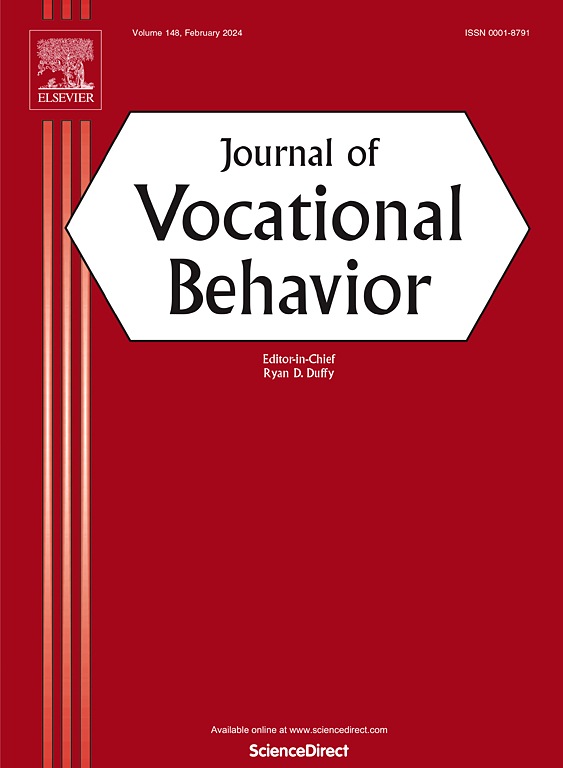离职的原因比“人们离开老板”要复杂得多:一种方法规避的观点
IF 5.2
1区 心理学
Q1 PSYCHOLOGY, APPLIED
引用次数: 0
摘要
人们辞职的说法在职业网站上很常见,甚至出现在学术文章中。从方法回避的角度来看,老板的格言表明,自愿离职是为了摆脱消极的人,这忽略了潜在的方法导向的原因。我们将常见的离职原因组织在接近和回避的动机框架内,并探讨回避导向的离职原因(其中包括老板问题)是否以及在多大程度上真的超过了接近导向的离职原因。利用不同的数据来源——系统的文献综述、在线调查和离职访谈——我们还采用了一种组合方法,并从测量的角度讨论了研究结果。总体而言,研究结果表明,与回避相关的离职原因比方法导向的原因更重要。压力(由于工作负荷过大)是最重要的逃避原因,其次是老板问题。然而,这两个原因很少是员工离职的唯一原因。以回避和方法为导向的原因经常同时发生,而与方法有关的原因,如在其他地方获得晋升的机会,有时同样重要,甚至更重要。此外,与晋升相关的方法导向原因在离职面谈中更为突出,而老板问题在员工对前雇主的在线评论中更为突出。总之,我们得出结论,老板的格言过于简化了与接近和回避相关的离职原因的复杂现实。我们进一步得出结论,离职原因应考虑其评估目的,并考虑不同的离职组合和类型是有意义的。最后,我们提出了未来研究如何利用方法-回避-视角研究离职原因的想法。本文章由计算机程序翻译,如有差异,请以英文原文为准。
Turnover reasons are more complex than “people quit bosses”: An approach-avoidance perspective
The claim that people quit bosses is common on career websites and has even entered academic articles. From an approach-avoidance lens, the boss adage suggests that voluntary turnover is about escaping from somebody negative, which neglects potential approach-oriented reasons. We organize common turnover reasons within the motivational framework of approach and avoidance and explore whether and to what extent avoidance-oriented turnover reasons (among them boss issues) really outweigh approach-oriented ones. Leveraging different data sources—a systematic literature review, an online survey, and exit interviews—we also pursue a combinational approach and discuss findings from a measurement perspective. Overall, findings suggest that avoidance-related turnover reasons are somewhat more important than approach-oriented reasons. Stress (due to work overload) emerged as the most important avoidance-related reason, followed by boss issues. Yet, these two reasons were rarely employees' sole turnover reasons. Avoidance- and approach-oriented reasons often occurred in combination, and approach-related reasons such as the opportunity for advancement elsewhere were sometimes equally or even more important. Further, approach-oriented reasons related to advancement were more salient in exit interviews, and boss issues were more salient in employee online-reviews of their former employers. Altogether, we conclude that the boss adage is too much of a simplification of the complex reality of approach-and-avoidance-related turnover reasons. We further conclude that turnover reasons should be understood considering their assessment purpose and that it is meaningful to consider different combinations and types of leaving. Finally, we present ideas on how future research can utilize the approach-avoidance-perspective on turnover reasons.
求助全文
通过发布文献求助,成功后即可免费获取论文全文。
去求助
来源期刊

Journal of Vocational Behavior
PSYCHOLOGY, APPLIED-
CiteScore
13.10
自引率
5.40%
发文量
85
期刊介绍:
The Journal of Vocational Behavior publishes original empirical and theoretical articles offering unique insights into the realms of career choice, career development, and work adjustment across the lifespan. These contributions are not only valuable for academic exploration but also find applications in counseling and career development programs across diverse sectors such as colleges, universities, business, industry, government, and the military.
The primary focus of the journal centers on individual decision-making regarding work and careers, prioritizing investigations into personal career choices rather than organizational or employer-level variables. Example topics encompass a broad range, from initial career choices (e.g., choice of major, initial work or organization selection, organizational attraction) to the development of a career, work transitions, work-family management, and attitudes within the workplace (such as work commitment, multiple role management, and turnover).
 求助内容:
求助内容: 应助结果提醒方式:
应助结果提醒方式:


